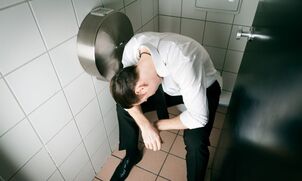Prostatitis is one of the most common urological diseases in which an inflammatory process involving the tissues of the prostate gland develops. Prostatitis can manifest itself in men of any age and is often accompanied by other diseases of the reproductive system. The causes of prostatitis in men may be different and should be considered in more detail to reduce the likelihood of developing the disease.
Classification

There are three main forms of prostatitis associated with the development of the pathological process:
- Sharp.Symptoms appear suddenly and are most pronounced. Therefore, most men with an acute course of prostatitis consult a doctor in the first days of the open course of the process. A typical symptom of the disease is severe back pain, which occurs against the background of a rise in body temperature to 39 degrees. Often, the cause of prostatitis is an infectious focus that can develop in distant organs.
- Chronic.If acute prostatitis is not treated in time, the disease becomes chronic. It is characterized by less severe symptoms and the general condition of the patient can be called satisfactory. The temperature drops to normal.
- stagnant.Non-infectious inflammatory process. It is caused by stagnant processes observed in the pelvic organs. The disease is characterized by progressive development with a gradual increase in pathological symptoms. Today, this form of the disease is extremely rare.
The chronic form of the disease is considered very dangerous, because most men ignore the mild symptoms and delay seeing a specialist. With this approach, the development of numerous complications of the disease is possible.
The disease has "rejuvenated" over time and can therefore occur at any age.
What causes prostatitis?
This disease develops in one third of men aged 20-60 years. Therefore, unlike a number of diseases of the genitourinary system, this disease can not be called age-related. There are a number of causes of prostatitis in men, the basics of which will be discussed below.
Acute and chronic infections
Infectious lesions are the leading cause of prostatitis. When the infection enters the prostate, an inflammatory process develops. In most cases, diseases such as gonorrhea and urethritis become provocateurs of these forms of prostatitis.
Caries, tonsillitis, tuberculosis and other pathological processes can lead to the development of infectious prostatitis.
To treat this form of the disease, it is necessary to eliminate the infectious agent that is the main cause of its development. Prostatitis can be completely cured only after neutralizing the main infectious agent.
Do not block

Every man should have enough sex in his life - otherwise he will not avoid prostate problems.
Lack of regular sex can result in prostate congestion. At the same time, the blood circulation in the body is disrupted, resulting in occult stagnation, which disrupts its work. All this can lead to deformity of the prostate and the development of an inflammatory process.
Regular sexual activity helps prevent stagnation of prostate secretions. In addition, experts advise patients to avoid abusive relationships by finding a regular sexual partner.
sedentary work
In recent decades, there has been a sharp trend in the transition to manual mental labor. One of the main causes of prostatitis in men is a sedentary lifestyle.
In addition, a sedentary lifestyle leads to dysfunction of the nervous, endocrine and cardiovascular systems. As a result, the cells of the prostate gland receive less oxygen, which leads to the creation of optimal conditions for the growth of pathogenic microflora.
Although sedentary work is not a direct cause of prostatitis, it creates optimal conditions for prostate infection. Therefore, to prevent prostatitis, the body must exercise regularly.
When you lead an active lifestyle, your blood flow normalizes and your endocrine and nervous systems work better. For this reason, the tissues of the prostate gland are protected from lack of oxygen.
Long-term abstinence
In the absence of regular sexual activity, the secretion stagnates in the body. In this regard, blood circulation in the tissues of the prostate is difficult. The result is the same as when you lead a passive lifestyle.
Oxygen starvation leads to the creation of ideal conditions for the growth of pathogenic microflora in the tissues of the prostate gland. As a result, only a weak infection of the body will be enough to ensure the guaranteed development of prostatitis.
Hypothermia

Ice cream is a sure way to prevent pathology.
Scientists claim that hypothermia is one of the main provocateurs in the development of prostatitis. Prostatitis from hypothermia develops for several reasons:- Hypothermia causes vasoconstriction, which weakens tissue nutrition and worsens organ function.
- Significant freezing of the body weakens the human immune system. This makes the body susceptible to various infectious lesions.
Hypothermia is especially dangerous for men who have previously developed prostatitis. Even if the disease is treated, it can recur.
To prevent the development of prostatitis, it is necessary to dress warmly in the cold season and avoid sitting on cold and cold surfaces. It is also forbidden to walk barefoot on a sufficiently warm floor.
Other reasons
The development of prostatitis can occur not only for the above reasons, but also under the influence of such factors:
- obesity;
- poor working conditions with a strong load or significant concussion in the perineal region;
- hormonal diseases;
- ARVI is transferred on the legs;
- Chronic constipation.
The best way to prevent this disease is to avoid the above factors. Men with a history of prostatitis are particularly susceptible to the disease.
Who is at risk
Anyone who has had a problem with the prostate gland in the past may experience the disease again.
After thinking about what causes prostatitis, you need to determine the group of people who are prone to appearance. The following men are susceptible to prostatitis:

- lead a sedentary lifestyle;
- often suffers from constipation;
- obez;
- engaged in sedentary work;
- is subject to severe stress and heavy physical labor;
- irregular sexual intercourse or frequent changing sexual partners;
- previously had prostatitis;
- suffering from immune diseases;
- alcohol and cigarette users.
Features of development in youth and old age
Prostatitis can develop in young people due to a number of factors. The basics are: sedentary work, lack of a full intimate life, sedentary lifestyle. To minimize the development of this disease, you should eliminate these factors from your life.
In the elderly, the disease most often develops against the background of depletion of sexual function. As the body ages, the reproductive system undergoes changes and eventually ceases to function. Significant reductions in fertility are observed in men aged 45-50 years.
In addition, this can occur under the influence of hormonal changes in the body due to decreased testosterone production. One of the main causes of prostatitis is these changes.
Causes of transition from acute to chronic stage of the disease
While acute prostatitis is characterized by vivid symptoms, if the patient is forced to consult a specialist, the chronic form usually has no characteristic symptoms. In most cases, men do not rush to the doctor, feeling a slight discomfort. And as a result, the disease becomes more severe.
How does the disease become chronic? Often, an acute form of the disease that is not adequately treated leads to the development of a chronic process. In this case, the transition from one form to another occurs under the influence of the following factors:
- Treatment started late.
- Ineffective therapy was given or the wrong technique was chosen.
- The patient's immune response is significantly reduced.
- There was no cure for acute prostatitis.
It should be understood that the asymptomatic chronic course of the inflammatory process sooner or later ends in exacerbation. Then the patient has all the symptoms of the disease, including severe pain in the perineum and lower back, difficulty urinating and depression of sexual activity.
Chronic prostatitis has an important feature: when the initial inflammation of the prostate occurs, the innervation of this organ deteriorates. This has a very negative effect on their work and often leads to autoimmune processes. In this case, the immune system begins to produce antibodies against prostate tissue. Therefore, even if the primary infection is eliminated, it will not be possible to avoid the development of such prostatitis.
symptoms

The main symptom of prostatitis is pain. Indicates the development of an inflammatory process in the prostate. Unpleasant feelings in this situation may be of a different nature and intensity. Urination causes severe pain.
This is of particular concern as the disease is in an acute stage of development. Against the background of severe pain, the patient's sleep is disturbed, performance, quality of life is significantly reduced.
Pain in prostatitis has the following nature:
- localized in the perineum, lower abdomen, waist;
- radiates to the genital area;
- Unpleasant feelings intensify in the process of excitement and ejaculation when coming to the toilet;
- is accompanied by sexual dysfunction.
Erection problems are a common symptom of a chronic form of the disease. Because such dysfunctions can manifest to varying degrees, their treatment has some differences.
It is not uncommon for men to have a slow erection with prostatitis. Most patients are unable to complete sexual intercourse or ejaculate prematurely. Such disorders adversely affect sperm composition.
Treatment methods
The specific type of therapy is prescribed by a specialist based on the characteristics of the disease. In this case, the reasons for the development of this disease must be taken into account. Thus, the main method of treatment of acute forms of the disease is antibiotic therapy. These drugs are taken even if the disease is not bacterial.
Complex treatment is provided for chronic prostatitis. This includes the following procedures:
- drug treatment;
- physiotherapy;
- taking immunomodulators;
- prostate massage.
If chronic prostatitis is non-bacterial in nature, treatment is with non-steroidal anti-inflammatory drugs. Sedatives are used as an additional treatment.
Prevention of prostatitis is reduced to an active lifestyle, regular sexual intercourse with a regular partner and timely treatment of infectious diseases.
























